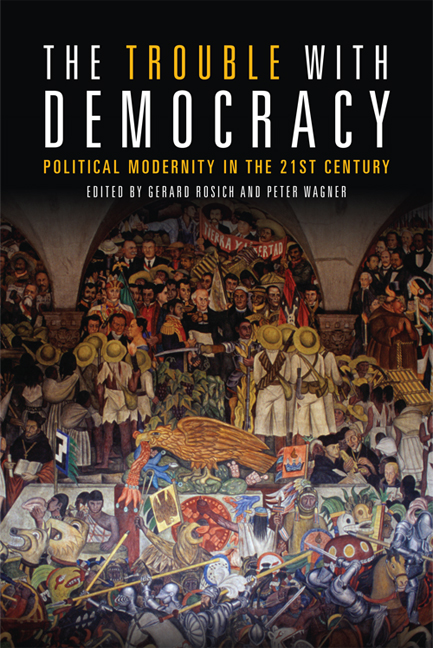Book contents
- Frontmatter
- Contents
- Acknowledgements
- List of Contributors
- 1 Introduction: Re-Interpreting Democracy for Our Time
- 2 Autonomy in and between Polities: Democracy and the Need for Collective Political Selves
- 3 Rethinking ‘Modern’ Democracy: Political Modernity and Constituent Power
- 4 Democratic Surplus and Democracy-in-Failing: On Ancient and Modern Self-Cancellation of Democracy
- 5 Setbacks of Women's Emancipation (Condition, Consequence, Measure and Ruse)
- 6 Political Modernity, Democracy and State–Society Relations in Latin America: A New Socio-Historical Problématique?
- 7 Communitarian Cosmopolitanism: Argentina's Recuperated Factories, Neoliberal Globalisation and Democratic Citizenship. An Arendtian Perspective
- 8 Middle-Classing in Roodepoort: Unexpected Sites of Post-Apartheid ‘Community’
- 9 Democracy and Capitalism in Europe, Brazil and South Africa
- 10 From Realism to Activism: A Critique of Resignation in Political Theory
- 11 The World as We Find It: A Suggestion for a Democratic Theory for Our Times
- 12 Epilogue: Democracy as Capacity for Self-Transformation
- Index
9 - Democracy and Capitalism in Europe, Brazil and South Africa
Published online by Cambridge University Press: 05 September 2016
- Frontmatter
- Contents
- Acknowledgements
- List of Contributors
- 1 Introduction: Re-Interpreting Democracy for Our Time
- 2 Autonomy in and between Polities: Democracy and the Need for Collective Political Selves
- 3 Rethinking ‘Modern’ Democracy: Political Modernity and Constituent Power
- 4 Democratic Surplus and Democracy-in-Failing: On Ancient and Modern Self-Cancellation of Democracy
- 5 Setbacks of Women's Emancipation (Condition, Consequence, Measure and Ruse)
- 6 Political Modernity, Democracy and State–Society Relations in Latin America: A New Socio-Historical Problématique?
- 7 Communitarian Cosmopolitanism: Argentina's Recuperated Factories, Neoliberal Globalisation and Democratic Citizenship. An Arendtian Perspective
- 8 Middle-Classing in Roodepoort: Unexpected Sites of Post-Apartheid ‘Community’
- 9 Democracy and Capitalism in Europe, Brazil and South Africa
- 10 From Realism to Activism: A Critique of Resignation in Political Theory
- 11 The World as We Find It: A Suggestion for a Democratic Theory for Our Times
- 12 Epilogue: Democracy as Capacity for Self-Transformation
- Index
Summary
Economic developments are often seen as following their own logics: driven by scientific-technical innovations, such as in the three ‘industrial revolutions’; by market laws of competition and utility, as assumed by the economic sciences; or by profit-seeking expansion and commodification, as maintained by neo-Marxist critical theory. There is a broad consensus today that we have entered a new phase of capitalism since the 1980s, and all three approaches have been employed to understand the recent transformation of capitalism and the specific dynamics of this new phase. To emphasise the inherent logics of an industrial-capitalist-market economy, however, entails downplaying the impact of other social phenomena on economic developments. Such selective emphasis has long been enhanced by disciplinary specialisation in the social sciences and by the assumption that ‘modern societies’ are functionally differentiated and permit each ‘subsystem’ to operate on its own terms. Nevertheless it is surprising that such emphasis is maintained in a context in which ‘the economy’ is marked by dysfunctions, generating crises, poverty, inequality, unemployment and the devastation of the earth, and in which calls for political action to put the economy back on a societally beneficial track are widely voiced. After all, we supposedly live in an era of ‘democratisation’; and if democracy means collective self-determination, it should be possible, in principle, to regulate economic action with a view to collective benefit.
As we shall see, current analyses of capitalism and democracy tend to argue that the posture of ‘yes we can’ is nothing but misplaced political voluntarism and that political claims today are merely another case of ‘we want but we cannot’, to use a common Spanish expression. This chapter, in contrast, argues that democracy matters and can bring about transformations of capitalism, though not without unintended consequences. It will start, in the first section, from observations on a recent turn in the European – or ‘Northern’ – analysis of capitalism away from political considerations and back towards the emphasis on the economy alone. A critical discussion of this shift shows that its limitations arise through its temporally and spatially confined perspective.
- Type
- Chapter
- Information
- The Trouble with DemocracyPolitical Modernity in the 21st Century, pp. 212 - 232Publisher: Edinburgh University PressPrint publication year: 2016



